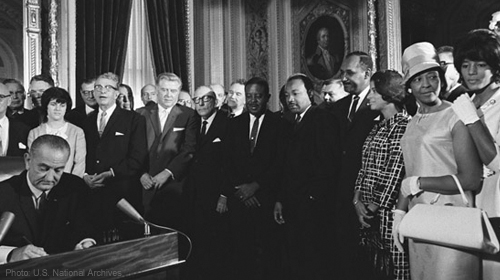In North Carolina and Across the Nation, The Voting Rights Act is Still Necessary


The right of every eligible citizen to cast a ballot and participate in the democratic process is one of the most deeply held American values. But, as any observer of history knows, that right has not always been extended equally in North Carolina or across the nation, particularly to African-Americans and other voters of color. In 1965, efforts to suppress the votes of minorities, particularly in the South, led the United States Congress to pass the historic Voting Rights Act (VRA), which has, for generations, been used to ensure that elections are free, fair, and accessible to all eligible voters.
The 2006 re-authorization of the Voting Rights Act was an all too rare moment in our politics. Instead of seeking momentary political advantage, lawmakers on both sides of the aisle worked together to ensure that the promise of our democracy was extended to the next generation of voters. The House of Representatives approved re-authorization by a stunning 390-33 margin, with unanimous 98-0 approval in the Senate days later. President George W. Bush brought together Republicans and Democrats as he signed a 25-year extension of a law exemplifying "our continued commitment to a united America where every person is valued and treated with dignity and respect."
What led to this bipartisan success?
Hard work and plain need: throughout 2005 and 2006, Congress compiled a tremendous record documenting the ongoing justifications for the VRA. In examining over 15,000 pages, Congress found that the nation as a whole, as well as the South, had made some strides in ensuring equal access to the vote since passage of the VRA. But at the same time, the record contained "a mountain of testimony" clearly showing "pervasive discrimination" in voting changes in the South and other covered jurisdictions, according to then-House Judiciary Chairman Republican James Sensenbrenner.
This voluminous Congressional record stands in stark contrast to the Supreme Court's 5-4 decision this week in Shelby County, Alabama v. Holder. Writing for the majority to invalidate Section 4 of the VRA, Chief Justice John Roberts noted that the legislation "has proved immensely successful at redressing racial discrimination and integrating the voting process." He admitted "voting discrimination still exists; no one doubts that." But despite these acknowledgments and ample Congressional findings to the contrary, the majority dismissed Section 4 as having outlived its usefulness.
Chief Justice Roberts need only look to North Carolina to find evidence that the VRA and its coverage formula still have an essential purpose to serve today. The federal approval requirement, known as "preclearance," applied to 40 North Carolina counties through Section 4, blocking 43 discriminatory voting laws from going into effect from 1982 to 2006. These measures included multiple efforts to oust the sole African-American representative on elected bodies. In this legislative session alone, our General Assembly has proposed bills that would end same-day voter registration, limit early voting, and require voters to present forms of ID that many North Carolinians lack and cannot easily obtain. The 2011 legislative session brought about a similarly regressive redistricting plan. What do these measures have in common? Each would disproportionately impact African-Americans and Latinos in our state, making it more difficult for them to vote or have their vote count in a meaningful fashion. Only hours after the Supreme Court ruled North Carolina voting restrictions were no longer subject to preclearance, the state Senate Rules Chairman announced plans to take up photo ID legislation that had laid dormant in his committee for months. One of the bill's primary sponsors then spoke of potentially "tightening" the already exceptionally restrictive bill such that "the number and types of IDs that are accepted" would be further limited. Someone should have informed our legislature that the Supreme Court had just ruled the past is not prologue.
Justice Ruth Bader Ginsburg aptly summed up the majority's incoherent attack on the VRA when she wrote in dissent, "[t]hrowing out preclearance when it has worked and is continuing to work to stop discriminatory changes is like throwing away your umbrella in a rainstorm because you are not getting wet." Before the General Assembly and Governor Pat McCrory rush through legislation making it harder for North Carolinians to vote, they should do what the Supreme Court did not: weigh the "mountain of evidence" testifying to the fact that we have not yet reached our stated commitment to equality at the polls. This approach brought Republicans and Democrats in Congress together to reauthorize the VRA in 2006. Failing to do so now harkens back to darker days from our nation and North Carolina's past.
Learn more about the Voting Rights Act and other civil liberty issues: Sign up for breaking news alerts, follow us on Twitter, and like us on Facebook.
Stay informed
Sign up to be the first to hear about how to take action.
By completing this form, I agree to receive occasional emails per the terms of the ACLU's privacy statement.
By completing this form, I agree to receive occasional emails per the terms of the ACLU's privacy statement.

